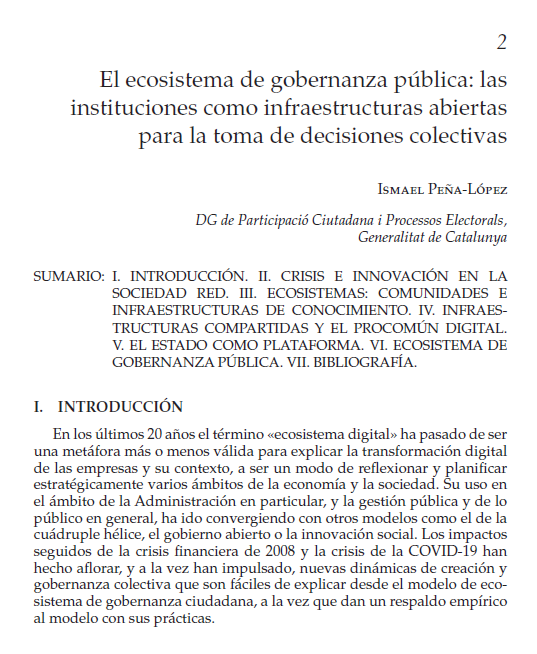At the beginning of the COVID-19 crisis I wrote about the differential impact of crisis in the Information Society based on the first fact that were quickly becoming evident before our eyes and at plain sight.
Shortly after, professors Josep M. Reniu and Víctor Meseguer led a monography on how the COVID-19 crisis was impacting democratic institutions and what to do about it. The book ¿Política confinada? Nuevas tecnologías y toma de decisiones en un contexto de pandemia [Confined politics? New technologies and decision-making in a pandemic context] focuses on how institutions are responding to a pandemic that keeps people at home or away from each other, and how they are figuring out ways of keeping in touch with citizens and keep performing the tasks they have been committed to.
I wrote a book chapter, the second one, with the aim to provide a wide landscape on how democratic institutions and the democratic arena are configuring themselves, and how the pandemic crisis may be an accelerator to it. On El ecosistema de gobernanza pública: las instituciones como infraestructuras abiertas para la toma de decisiones colectivas [The ecosystem of public governance: institutions as open infrastructures for collective decision-making] I take the idea of the citizen participation ecosystem to a higher level, trying to scale it up to the global public governance level.
To do so, I introduce the concept of ecosystems on social sciences, which have been applied with much success —in my opinion— to describe the quick deployment of digital business infrastructures. I describe such ecosystems as knowledge communities and infrastructures that wrok in open and shared ways, aiming at the building of a digital commons. Following, I review the idea of ‘the state as a platform’, ending up with a definition and proposal of the ecosystem of public governance, which I define as:
A public governance ecosystem is a technopolitical, self-organized, autopoietic, replicable and scalable system that articulates actors, spaces and instruments around a set of open and distributed infrastructures rich on knowledge for collective decision-making.
A preprint of the whole chapter (in Spanish) and the bibliography I used can be accessed below.
Downloads
Peña-López, I. (2020). “El ecosistema de gobernanza pública: las instituciones como infraestructuras abiertas para la toma de decisiones colectivas”. In Reniu i Vilamala, J.M. & Meseguer, J.V. (Eds.), ¿Política confinada? Nuevas tecnologías y toma de decisiones en un contexto de pandemia, Capítulo 2, 53-71. Cizur Menor: Thompson-Reuters/Aranzadi.
Bibliography
If you need to cite this article in a formal way (i.e. for bibliographical purposes) I dare suggest:
Peña-López, I. (2020) “BOOK CHAPTER. The ecosystem of public governance: institutions as open infrastructures for collective decision-making” In ICTlogy,
#205, October 2020. Barcelona: ICTlogy.
Retrieved month dd, yyyy from
https://ictlogy.net/review/?p=4773
Previous post: Citizen Participation in policy-making: internalizing externalities and preventing conflict through planning and evaluating
Next post: GUIDE. Guide to gender mainstreaming in participatory processes
 RSS feed for comments on this post.
TrackBack URI
RSS feed for comments on this post.
TrackBack URI


